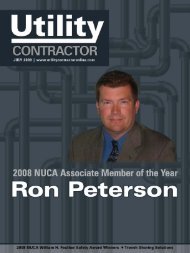View Full December PDF Issue - Utility Contractor Online
View Full December PDF Issue - Utility Contractor Online
View Full December PDF Issue - Utility Contractor Online
You also want an ePaper? Increase the reach of your titles
YUMPU automatically turns print PDFs into web optimized ePapers that Google loves.
these agreements will reduce your review time, your questions and<br />
the attorney’s fees you incur clarifying the meaning of the various<br />
standard clauses. A perfect example is a dispute resolution clause,<br />
as it will likely be included in each of these agreements. A company<br />
should strive for consistency and compatibility for these agreements<br />
so to ensure predictability and efficiency and to reduce the amount<br />
of legal fees incurred for decoding the legal impact of such clauses.<br />
5. Cultivate and Protect Your Company<br />
Intellectual Property (IP)<br />
Company trade secrets are protectable IP, and comprise<br />
information that: (i) is not publicly available; (ii) provides a<br />
commercial advantage; and (iii) subject to reasonable efforts to<br />
maintain secrecy. These can include client lists, production or<br />
construction methods, production formulas, marketing strategies,<br />
pricing strategies and other commercially sensitive materials.<br />
Protect you company’s IP with written confidentiality and<br />
intellectual property agreements and safe practices for ensuring<br />
such information is not accessible by non-essential personnel.<br />
6. Comply with All <strong>Contractor</strong><br />
Licensing Requirements<br />
When performing work that requires licensing, ensure that your<br />
company obtains all proper licenses. Each state treats licensing infractions<br />
differently, but an unlicensed contractor is always at risk.<br />
For example, Washington and California are both very strict about<br />
licensing and limit recovery of claims by unlicensed contractors.<br />
A number of states also impose both civil monetary penalties and<br />
criminal sanctions for licensing violations. Additionally, some<br />
states declare any contracts with unlicensed contractors null and<br />
void and/or allow disgorgement of any previous payments to unlicensed<br />
contractors. Do not underestimate the consequences of<br />
improper licensing.<br />
Similarly, contractors should also be cognizant of any special<br />
licensing requirements for performing work on tribal land. There<br />
has been a construction boom nationally with respect to casinos<br />
and other establishments for Indian tribes on Indian tribal land.<br />
Thus, licensing issues on tribal land have become a relevant concern.<br />
To commence construction, tribes often require special business<br />
and building permits, which are granted by the tribe.<br />
7. Properly Classifying Workers as Either<br />
Employees or Independent <strong>Contractor</strong>s<br />
The proper classification of a worker has implications in a number<br />
of areas including: wages and hours, unemployment and worker’s<br />
compensation and tax liability. To make matters worse, a worker<br />
may be considered an independent contractor for tax purposes, but<br />
an employee for unemployment purposes. Generally, independent<br />
contractors receive far fewer protections under state and federal law,<br />
and organizations have less obligations and liabilities toward them.<br />
However, the federal government and a number of states are beginning<br />
to give greater attention to misclassification of workers, which<br />
can result in fines, penalties, stop work orders and back taxes.<br />
Learning to assess relative risk is crucial in<br />
protecting a utility contractor’s business. Take<br />
a photo of this QR code with your smart phone<br />
and read an article specifically on protecting<br />
yourself from uninsurable risks.<br />
The determination of<br />
whether a worker is an independent<br />
contractor or an<br />
employee is very fact specific,<br />
and may vary depending<br />
on the agency and state.<br />
But, at the most basic level,<br />
a worker may be an independent<br />
contractor when<br />
he controls the means and<br />
methods by which the work<br />
is done. Courts also consider<br />
factors such as whether<br />
or not they are paid the<br />
same weekly wage and own<br />
their own tools. Moreover,<br />
the employer bears the burden<br />
of proving the existence<br />
of an independent contractor<br />
relationship. Given the<br />
Breaking up your business can help<br />
protect it. A company should consider<br />
forming separate business entities for<br />
operations, holding equipment and, if<br />
applicable, even office ownership.<br />
increased scrutiny and penalties for misclassification of workers, it<br />
is important that organizations carefully analyze the employment<br />
status of each worker under applicable federal and state law.<br />
8. Business Continuity Plans<br />
An important consideration for any company is a well formulated<br />
business continuity plan. Many closely held companies are unprepared<br />
for business continuity after the founder or major shareholder<br />
retires, becomes disabled or is deceased. Thus, contractors<br />
should consider how to hold on to key employees and develop<br />
plans for operations in the event that something happens to the<br />
owner or a key person. With regard to keeping employees, contractors<br />
may want to consider various incentives, such Employee Stock<br />
Ownership Plans (ESOPs), or other mechanisms to give employees<br />
a stake in the business. A business continuity plan should also consider<br />
other risks and interruptions that can negatively affect business,<br />
such as IT failures, supplier default and economic slowdown.<br />
Preparation in event of unforeseen circumstances is important to<br />
ensuring that business can continue to run smoothly.<br />
Conclusion<br />
In this volatile market, it has become increasingly important<br />
that contractors exercise smart business legal judgment to help<br />
ensure continued success. Accordingly, this article sheds light on<br />
a number of topics that contractors should consider when making<br />
future business decisions. The foregoing is provided for informational<br />
purposes only and should not be construed as legal<br />
advice. <strong>Contractor</strong>s are encouraged to consult with an attorney<br />
of their choice to discuss their own individual circumstances.<br />
Paul Tonella is a Partner at the law firm of Oles Morrison Rinker & Baker,<br />
which represents hundreds of closely held companies in their corporate<br />
management, succession planning, tax, real property and general business<br />
needs. Contact: Tonella@OLES.com or 206-623-3427<br />
Firm associate Benjamin Greenberg earned his law degree from<br />
Boston College Law School. During law school, he was a Staff Writer<br />
for Boston College Law Review and was Co-President of the Criminal<br />
Justice La Project. Contact: Greenberg@OLES.com or 206-623-3427<br />
<strong>December</strong> 2011 | <strong>Utility</strong> <strong>Contractor</strong> 25

















